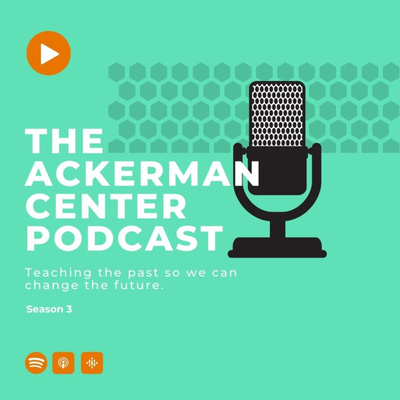
The Ackerman Center Podcast
By Ackerman Center

The Ackerman Center PodcastAug 02, 2020

Ep. 56 Arts Based Research - An interview with Dr. Charlotte Schallié
In this episode, Belofsky Fellow Katie Fisher sits down with Dr. Charlotte Schallié, an author and professor of German Studies at the University of Victoria, to discuss the importance of arts-based research. Dr. Schallié spoke at the Annual Scholar’s Conference about her collaborative research work with Holocaust survivors and graphic novelists which produced the novel "But I Live: Three Stories of Child Survivors of the Holocaust." What sets this project apart is its innovative format as a graphic novel, offering poignant visual narratives of three survivors' experiences during and after the Holocaust.
During the interview, Schallié shares insights into her collaborative process with artists, shedding light on how she orchestrated their contributions to bring the stories onto the page. Together, Schallié and Fisher discuss the delicate balance of creating a safe and inclusive space for students to learn about mass atrocities while also not hiding the horrors of the events studied.
Charlotte Schallié delivered the 2024 Mitchell L. and Miriam Lewis Barnett Lecture at The 54th Annual Scholars’ Conference on the Holocaust and the Churches

Ep. 55 Echoes of Tragedy - An Interview with Father Patrick Desbois
In this episode, Dr. Nils Roemer sits down with Father Patrick Desbois, the esteemed founder of Yahad – in Unum, and they discuss his presentation of the 2024, Einspruch Lectures on the Holocaust and the mission of his organization in identifying Holocaust mass execution sites. The conversation centers on his acclaimed book, The Holocaust by Bullets, which earned him the National Jewish Book Award. Father Desbois shares insights into the atrocities of World War II, emphasizing the mass killings and destruction of graves. He extends the discussion to his research on ISIS, the Yazidi genocide, and the suffering of women across diverse backgrounds, providing a poignant glimpse into the darker pages of history.

Ep. 54 An Interview with Dr. Hanno Berger
In this episode, Dr. Nils Roemer hosts an an engaging conversation with our newest faculty member, Dr. Hanno Berger, an assistant professor in film studies at the Harry W. Bass Jr. School of Arts, Humanities, and Technology. Dr. Berger delves into his research on postwar German films, sharing fascinating insights into revolutions and their multifaceted impact. He offers a deep exploration of Hannah Arendt's influential book "On Revolution", which served as the foundation for his PhD thesis. Additionally, Dr. Berger sheds light on his role as one of the editors of Hannah Arendt's renowned work, "The Origin of Totalitarianism." Tune in for an enlightening discussion on film, revolutions, and the profound influence of Arendt's writings on modern discourse.

Ep. 53 A look at Bollywood's First Exploration of the Holocaust with Dr. Mehak Burza
Join us as we take a close look at the unique Bollywood film, "Bawaal." Our guest, Dr. Mehak Burza, is an expert in Holocaust studies who teaches in the Department of English at University of Delhi (New Delhi, India). Dr. Nils Roemer and Dr. Burza speak about this film and her recent article "The State of Holocaust Awareness in India is Abysmal" where she points out that many people in India do not have in-depth knowledge about the Holocaust. Together they explore how "Bawaal" impacts Indian viewers, especially young people.

Ep. 52 An Interview With Dr. Martin Dean
In this episode, Dr. Nils Roemer and Angie Simmons have a meaningful conversation with Dr. Martin Dean, a respected scholar and the 2023 keynote speaker at the Annual Scholar’s Conference. Dr. Dean's book, "Collaboration in the Holocaust: Crimes of the Local Police in Belorussia and Ukraine" provides us an understanding how different groups collaborated in committing crimes during the Holocaust. This work developed out of his years working alongside Scotland Yard.
Dr. Martin Dean delivered the Michael And Elaine Jaffe Lecture at the 53rd Annual Scholar’s Conference.

Ep. 51 An Interview with Glenn Kurtz
In this episode of the Ackerman Center podcast, we speak with author and Annual Scholar’s Conference keynote speaker Glenn Kurtz about the adaptation of his book Three Minutes in Poland: Discovering a Lost World in a 1938 Family Film into a documentary film titled Three Minutes-A Lengthening. He discusses the path that led him to writing the book and discovering the film amongst his family’s home movies as well as the years of research that he has embarked on as a result.
Glenn Kurtz delivered the 2023 Mitchell L. and Miriam Lewis Barnett Lecture at the Annual Scholar’s Conference.

Ep. 50 "Learning from the Germans - Race and the Memory of Evil" with Susan Neiman
This interview with Susan Neiman—Philosopher, Author, and Director of the Einstein Forum—and Dr. Nils Roemer was recorded in April 2021. The two discuss her book "Learning from the Germans" which delivers an urgently needed perspective on how a country can come to terms with its historical wrongdoings. It has been edited to better fit a podcast format.
-- In the wake of white nationalist attacks, the ongoing debate over reparations, and the controversy surrounding Confederate monuments and the contested memories they evoke, Susan Neiman’s Learning from the Germans delivers an urgently needed perspective on how a country can come to terms with its historical wrongdoings. Neiman is a white woman who came of age in the civil rights–era South and a Jewish woman who has spent much of her adult life in Berlin. Working from this unique perspective, she combines philosophical reflection, personal stories, and interviews with both Americans and Germans who are grappling with the evils of their own national histories. Through discussions with Germans, including Jan Philipp Reemtsma, who created the breakthrough Crimes of the Wehrmacht exhibit, and Friedrich Schorlemmer, the East German dissident preacher, Neiman tells the story of the long and difficult path Germans faced in their effort to atone for the crimes of the Holocaust. In the United States, she interviews James Meredith about his battle for equality in Mississippi and Bryan Stevenson about his monument to the victims of lynching, as well as lesser-known social justice activists in the South, to provide a compelling picture of the work contemporary Americans are doing to confront our violent history. In clear and gripping prose, Neiman urges us to consider the nuanced forms that evil can assume, so that we can recognize and avoid them in the future.

Ep. 49 Holocaust Memorials in Everyday Berlin Life
Join Dr. Nils Roemer and Belofsky fellows Angie Simmons and Katie Fisher on a walking tour of a few memorials scattered around Berlin. This episode dives into the locations and historical context around 5 prominent local Holocaust memorials in Berlin with a focus on what happened after the end of WWII. Throughout the episode noise of the contemporary cityscape blends with historical references provided by Dr. Nils Roemer.
Find out more about each of these memorials at the links below.

Ep. 48 Walking Tour: Berlin Memorial Sites
Join Dr. Nils Roemer and Belofsky fellow Katie Fisher on a walking tour of three memorials in Berlin—the Memorial to the Murdered Jews of Europe, the Memorial to Homosexuals Persecuted Under Nazism, and the Memorial to the Sinti and Roma Victims of National Socialism. This auditory experience captures the sound of the present-day cityscape with its traffic and tourist chatter and is layered with historical context and references provided by Dr. Nils Roemer.
Find out more about each of these memorials at the links below.
The Memorial to the Murdered Jews of Europe
The Memorial to Homosexuals Persecuted Under Nazism
The Memorial to the Sinti and Roma Victims of National Socialism

Ep. 47 An Interview with Film Director Sabina Vajrača
In this episode, Dr. Emily-Rose Baker, assistant professor of film studies at UT Dallas, interviews Sabina Vajrača an award-winning film director from Bosnia and Herzegovina who immigrated to the US as a war refugee at the age of 14. Her work deals with representations of inter-ethnic conflict particularly pertaining to the Bosnian war and genocide—as well as the Holocaust.
Watch Variables here: https://vimeo.com/337351085

Ep. 46: Kristallnacht - Night of Broken Glass
On November 9, 1938, a day that has come to be known as Kristallnacht, the Nazis orchestrated an attack against Jews, their businesses, synagogues, and their homes. This was followed by mass arrests and deportations to camps. In this episode, Dr. Roemer and Angie Simmons discuss the events that lead up to the attack, as well as the significance of this day and what would follow.

Ep. 45 A Conversation with Dina Porat
Dr. Dina Porat, professor emerita of modern Jewish history at the Department of Jewish History at Tel Aviv University and the chief historian of Yad Vashem, presented the Einspruch Lecture Series at the Ackerman Center this year. Her recent work focuses on debates around the definitions of antisemitism. In this episode, she and Dr. David Patterson sit down for a conversation.

Ep. 44 Walking Tour: Dachau Concentration Camp Memorial Site
Join Dr. Nils Roemer and Belofsky fellow Katie Fisher on a walking tour of the Dachau Concentration Camp Memorial Site outside of Munich, Germany. This auditory experience captures the sound of the present-day landscape with its birdsong and tourist chatter and is layered with historical context and references provided by Dr. Nils Roemer.

Ep. 43 The Forgotten Battle
The 2020 Dutch World War II film, The Forgotten Battle, follows the actions of three young characters: a Dutch Axis soldier, a British glider pilot, and a woman affiliated with the Dutch Resistance, as events unfold during the battle in which Allied forces attempted to regain control of German-occupied Zeeland. In this episode, Dr. Emily-Rose Baker and Angie Simmons discuss the film’s representation of this historical event and the Dutch resistance movement.

Ep. 42: 1945 Death Marches and the end of The Reich
As it became increasingly clear the Nazis would not overcome the Allied forces and would lose WWII, the Nazis forced survivors of the death camps to march toward the heart of German territory with the idea that they would restart their efforts to exterminate Europe's Jews. In this episode, Dr. Nils Roemer and Belofsky Fellow Angie Simmons discuss the ways in which the death marches signed the end of the Nazi reign of terror but also how it was just the beginning of figuring out what had unfolded during the years of the Third Reich.
The series, "A Year in the Third Reich," explores significant events that took place throughout the years of Hitler's Third Reich. In each episode, we refer to specific primary sources such as newspaper articles, photographs, and maps. To access and download the Primary Sources Handout for this episode, please visit: https://ackerman.utdallas.edu/virtual-outreach.

Ep. 41: 1944 Shifting Focus and Dismantling of Gas Chambers
Near the end of 1944, Himmler ordered the halt of the Final Solution and the destruction of the gas chambers at Auschwitz-Birkenau. As Allied troops carried out Air Raids on Germany, citizens felt the effects of war on their daily lives forcing the Nazis to shift their focus. In this episode, Dr. Nils Roemer and Belofsky Fellow Angie Simmons discuss the Posen Speeches and the Nazis shifting their focus.
The series, "A Year in the Third Reich," explores significant events that took place throughout the years of Hitler's Third Reich. In each episode, we refer to specific primary sources such as newspaper articles, photographs, and maps. To access and download the Primary Sources Handout for this episode, please visit: https://ackerman.utdallas.edu/virtual-outreach.

Ep. 40: 1943 Liquidation of Jewish Ghettos
In 1943 expectations about the outcome of WWII began to point toward the defeat of the Third Reich. Despite growing awareness about the coming fall of the Nazis, they would still go on to kill another 3 million more Jews. In this episode, Dr. Nils Roemer and Belofsky Fellow Angie Simmons discuss pivotal events in 1943 and highlight the Warsaw Ghetto uprising.
The series, "A Year in the Third Reich," explores significant events that took place throughout the years of Hitler's Third Reich. In each episode, we refer to specific primary sources such as newspaper articles, photographs, and maps. To access and download the Primary Sources Handout for this episode, please visit: https://ackerman.utdallas.edu/virtual-outreach.

Ep. 39: 1942 Deportations and Death Camps
In 1942 the events associated with the Holocaust began in earnest and grew in scale moving toward a continental genocide. This episode focuses on the building up of death camps, the mass deportations of Jews, and the start of gassing at killing centers.
The series, "A Year in the Third Reich," explores significant events that took place throughout the years of Hitler's Third Reich. In each episode, we refer to specific primary sources such as newspaper articles, photographs, and maps. To access and download the Primary Sources Handout for this episode, please visit: https://ackerman.utdallas.edu/virtual-outreach.

Ep. 38 Ukraine and Russia's War of Aggression
We are all looking for ways to make sense of the news about the war in Ukraine. In this episode, Dr. Nils Roemer and Dr. Emily-Rose Baker have a conversation with Dr. Yuliya Komska—a cultural historian and native Ukrainian who currently teaches at Dartmouth. Dr. Komska shared with us about the need to protect and rescue cultural heritage as Russian bombs threaten major sites and people flee the conflict. She also talks about the challenges facing Ukrainians who don't want to leave their communities as Russian aggression continues.

Ep. 37 Munich the Edge of War
The fictional Netflix film "Munich the Edge of War" depicts an attempted plot to remove Hitler. The film plays with the question of what if an attempt like this had been successful. In this episode, Angie Simmons and Dr. Emily-Rose Baker discuss the film and how it deals with representing WWII and the Holocaust.

Ep. 36: 1941 Operation Barbarossa
The attack on the Soviet Union launched on June 22nd, 1941 marked a turning point in the war and also in the racial politics of the Third Reich. Operation Barbarossa ultimately depleted the German army and lasted much longer than Hitler had anticipated. In the fall of 1941, Hitler conceived of The Holocaust and then began to implement it.
The series, "A Year in the Third Reich," explores significant events that took place throughout the years of Hitler's Third Reich. In each episode, we refer to specific primary sources such as newspaper articles, photographs, and maps. To access and download the Primary Sources Handout for this episode, please visit: https://ackerman.utdallas.edu/virtual-outreach.

Ep. 35: 1940 Tripartite Pact
In this episode of the series "A Year in the Third Reich," Dr. Nils Roemer and Angie Simmons (Belofsky Fellow) take a look at the Tripartite Pact, signed by Japan, Germany, and Italy on Sept. 27, 1940, took aim at the United States and had implications for how the war would progress. Along with embargos, this pact increased tensions between the United States and Japan in the time leading up to the attack on Pearl Harbor.
The series, "A Year in the Third Reich," explores significant events that took place throughout the years of Hitler's Third Reich. In each episode, we refer to specific primary sources such as newspaper articles, photographs, and maps. To access and download the Primary Sources Handout for this episode, please visit: https://ackerman.utdallas.edu/virtual-outreach.

Ep. 34: 1939 The Establishment of the Ghettos
Returning to our series "A Year in the Third Reich," Dr. Nils Roemer and Angie Simmons (Belofsky Fellow) discuss the establishment of the ghettos in Poland and the introduction of armbands for the Jewish population. They consider a newspaper article from Paris that was published in the New York Times. In asking the question, "What is the defining event of 1939?" we look back with historical hindsight. Many who lived through the events of the Holocaust and the rise of the Third Reich, however, might not have understood the importance of what they were experiencing or reading in the newspapers.
This episode is part of the series, "A Year in the Third Reich," where we explored significant events that took place throughout the early years of Hitler's Third Reich. In each episode, we refer to specific primary sources such as newspaper articles, photographs, maps, etc. To access and download the Primary Sources Handout for this episode, please visit: https://ackerman.utdallas.edu/virtual-outreach/.

Ep. 33 Catching up with Dr. Gonzalez
Join Dr. Nils Roemer as he catches up with Dr. Pedro Gonzalez Corona about his new position with the Ackerman Center and what he's looking forward to teaching in the spring semester.

Ep. 32 Welcoming Dr. Baker
Meet Dr. Emily-Rose Baker the new visiting assistant professor. In this episode, she and Dr. Nils Roemer talk about her research on the Holocaust by bullets and central and eastern European film studies.

Ep. 31: 1938 Eichmann and the "Office of Jewish Emigration"
In the season finale of "A Year in the Third Reich," professors Dr. Sarah Valente and Dr. Nils Roemer discuss the quickly changing landscape in 1938. During that year, the Nazis ramped up their effort to enforce removal of Jews from German and Austrian society and mobilized to remove Jews from these countries through a so-called emigration program led by Adolf Eichmann in Vienna.
This episode is part of a new series, "A Year in the Third Reich," where we explored significant events that took place throughout the early years of Hitler's Third Reich. In each episode, we refer to specific primary sources such as newspaper articles, photographs, maps, etc. To access and download the Primary Sources Handout for this episode, please visit: https://ackerman.utdallas.edu/virtual-outreach/.

Ep. 30: 1937: The Pacific War: The Rape of Nanking
In today's episode, professors Dr. Sarah Valente and Dr. Nils Roemer discuss the Japanese invasion of China in 1937, beginning the Pacific War, and the complex role of Nazi John Rabe in the Nanking Safety Zone. They also discuss the involvement of the Third Reich in the Spanish Civil War and new forms of increasing violence abroad, as well as in Nazi Germany, with the opening of the Buchenwald concentration camp.
This episode is part of a new series, "A Year in the Third Reich," where we explore significant events that took place throughout Hitler's Third Reich. In each episode, we refer to specific primary sources such as newspaper articles, photographs, maps, etc. To access and download the Primary Sources Handout for this episode, please visit: https://ackerman.utdallas.edu/virtual-outreach/.

Ep. 29: 1936: The Olympics in Berlin
In today's episode, professors Dr. Sarah Valente and Dr. Nils Roemer discuss the Olympics in Berlin of 1936, which set the Third Reich in the world's center stage.
This episode is part of a new series, "A Year in the Third Reich," where we explore significant events that took place throughout Hitler's Third Reich. In each episode, we refer to specific primary sources such as newspaper articles, photographs, maps, etc. To access and download the Primary Sources Handout for this episode, please visit: https://ackerman.utdallas.edu/virtual-outreach/.
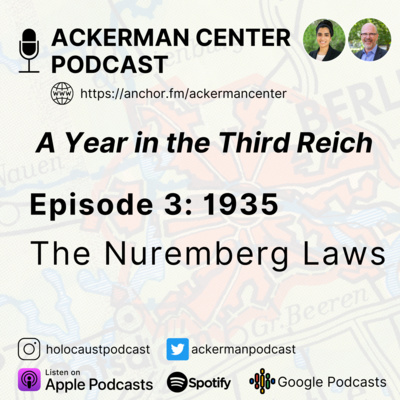
Ep. 28: 1935: The Nuremberg Laws
In today's episode, professors Dr. Sarah Valente and Dr. Nils Roemer discuss the Nuremberg Laws of 1935.
This episode is part of a new series, "A Year in the Third Reich," where we explore significant events that took place throughout Hitler's Third Reich. In each episode, we refer to specific primary sources such as newspaper articles, photographs, maps, etc. To access and download the Primary Sources Handout for this episode, please visit: https://ackerman.utdallas.edu/virtual-outreach/.
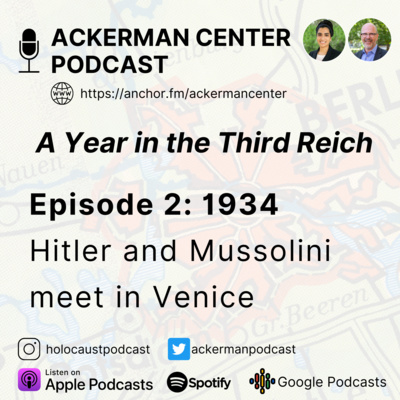
Ep. 27: 1934: Hitler and Mussolini meet in Venice
In today's episode, professors Dr. Nils Roemer and Dr. Sarah Valente discuss Hitler's meeting with Mussolini in Venice in 1934.
This episode is part of a new series, "A Year in the Third Reich," where we explore significant events that took place throughout Hitler's Third Reich. In each episode, we refer to specific primary sources such as newspaper articles, photographs, maps, etc. To access and download the Primary Sources Handout for this episode, please visit: https://ackerman.utdallas.edu/virtual-outreach/.
Follow us on https://www.instagram.com/holocaustpodcast/ and https://twitter.com/ackermanpodcast

Ep. 26: 1933: The Reichstag Fire & The Enabling Act
On January 30, 1933, Adolf Hitler became Chancellor of Germany. In today's episode, professors Dr. Nils Roemer and Dr. Sarah Valente discuss the Reichstag Fire and the Enabling Act of 1933.
This episode is part of a new series, "A Year in the Third Reich," where we explore significant events that took place throughout Hitler's Third Reich. In each episode, we refer to specific primary sources such as newspaper articles, photographs, maps, etc. To access and download the Primary Sources Handout for this episode, please visit: www.utdallas.edu/ackerman/virtual-outreach.
Follow us on https://www.instagram.com/holocaustpodcast/ and https://twitter.com/ackermanpodcast

Season 2: A Year in the Third Reich
Tune in next Sunday, January 31 at 10am for the first episode of our new podcast season.

Ep. 25: Creative Research ft. Jane Saginaw
In the first season finale, Dr. Sarah Valente and Dr. Nils Roemer invite Jane Saginaw, an outstanding PhD student in the Humanities program at UT Dallas, to read a few poems from her collection, "A Shift in Wind: Ten Poems of Women and the Holocaust," which she wrote as a creative research paper for Dr. Valente's graduate history course on Women and the Holocaust. Listen as Jane shares her deeply-moving poems and speaks about the women who inspired them, as well as the powerful mechanisms of resistance women developed as they fought to survive starvation, fatigue, and the brutalities of the Holocaust.
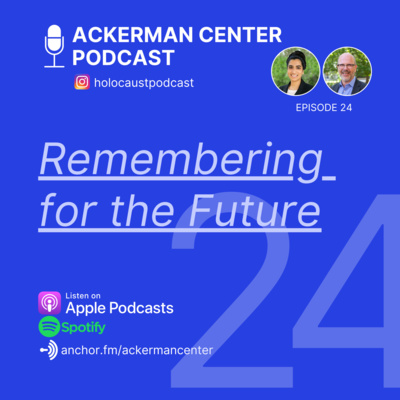
Ep. 24: Remembering for the Future
In this episode, Dr. Roemer and Dr. Valente discuss how the current pandemic changes the ways in which we engage with the past, history and Holocaust memory. #kristallnacht #remembrance #future

Ep. 23: Nuremberg Trials: Truth, Justice, and Memory
Dr. Sarah Valente and Dr. Nils Roemer reflect on the Ackerman Center's annual Einspruch Lecture Series, which took place on October 25 and featured Ben Ferencz. As the last living prosecutor for the US Army at the Einsatzgruppen Trial, one of the twelve military trials held by US authorities at Nuremberg, Germany, at 100 years old, Ben Ferencz shares words of wisdom with all of us. Listen to this special episode and share with those who are interested in truth, justice, and memory.
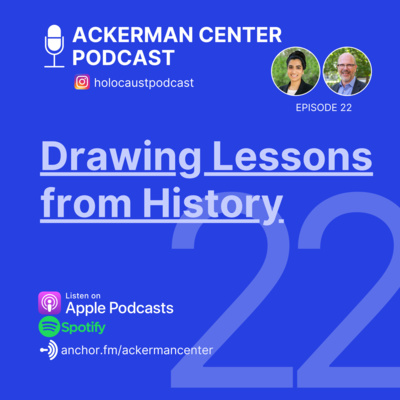
Ep. 22: Drawing Lessons from History
In this episode of the Ackerman Center Podcast, Dr. Sarah Valente interviewed Dr. Nils Roemer about the op-ed published in the Jewish Forward this week. Dr. Roemer together with other four German-born directors of Holocaust and genocide centers at American universities wrote the article "It is not too late for American Democracy — yet." You can also read the article at https://forward.com/scribe/455419/it-is-not-too-late-for-american-democracy-yet

Ep. 21: L'dor V'dor From Generation to Generation
In Episode 21: L’dor V’dor From Generation to Generation, Dr. Nils Roemer and Dr. Sarah Valente talk about the virtual celebration that took place last month to honor Dr. Zsuzsanna Ozsváth on the eve of her retirement from UT Dallas.
They also remember the late Justice Ruth Bader Ginsburg and discuss a 2004 speech she gave at the U.S. Holocaust Memorial Museum about antisemitism and how the Holocaust fueled her quest for justice.
Considering the alarming results of the Claims Conference survey on Holocaust knowledge and awareness in millennials and Generation Z, the professors discuss how it is imperative, now more than ever, to continue the center’s mission of “Teaching the Past, Changing the Future.”

Ep. 20: Navigating Unscripted Times
In this episode, Dr. Valente and Dr. Roemer discuss the beginning of new fall semester and navigating academic life under these unscripted times of the current pandemic. They also discuss the film When Hitler Stole Pink Rabbit, which was featured at the 2020 Jewish Film Festival of Dallas, a first time virtual film fest.

Ep. 19: "Portraits of World War II" featuring Dr. Zsuzsanna Ozsváth
We are excited to present the third and last episode of "Portraits of World War II." This special three-part series features beloved professors, brilliant scholars, and longtime UTD legends, whose childhoods and lives were marked by World War II. Today's special guest is Dr. Zsuzsanna Ozsváth, Professor of Literature and History, the Leah and Paul Lewis Chair of Holocaust Studies, and the founder and director of the Holocaust Studies Program at UTD, which is one of the distinguishing hallmarks of the University.
#Hungary #worldwarii #holocaustsurvivor #history #literature #poetry #translation
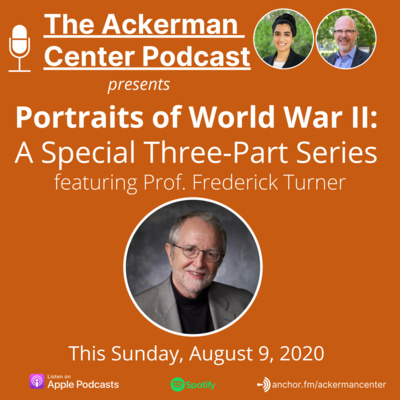
Ep. 18: "Portraits of World War II" featuring Prof. Frederick Turner
We are excited to present the second episode of "Portraits of World War II." This special three-part series features beloved professors, brilliant scholars, and longtime UTD legends, whose childhoods and lives were marked by World War II. Today's special guest is Prof. Frederick Turner, Founders Professor of Literature and Creative Writing, poet, and renowned translator.
#poetry #literature #history #translation #worldwarII #England

Ep. 17: "Portraits of World War II" featuring Dr. Rainer Schulte
We are excited to present the first episode of a special three-part series, "Portraits of World War II," which features longtime legends of the University of Texas at Dallas, beloved professors in the School of Arts & Humanities, and brilliant scholars, whose childhoods and lives were marked by World War II.
Today's special guest is Dr. Rainer Schulte, endowed professor of arts & humanities, founder and director of the UTD Center for Translation Studies, editor of Translation Review, and co-founder of the American Literary Translators Association (ALTA).
#translation #literature #languages #history #holocaust #worldwarii
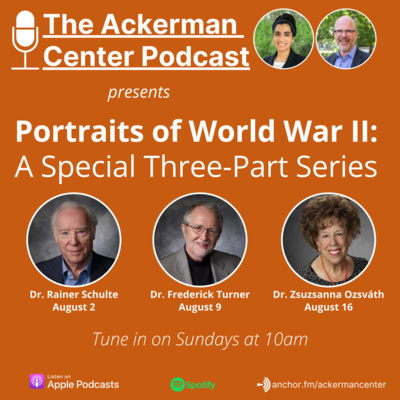
Promo: Portraits of WWII
The Ackerman Center Podcast presents a special new series "Portraits of World War II". This new three-part series features beloved professors, brilliant scholars, and longtime UTD legends Dr. Rainer Schulte, Dr. Fred Turner, and Dr. Zsuzsi Ozsváth as they address WWII's impact in their childhoods and lives. Tune in this Sunday, August 2 at 10am for the first episode of this special three-part series.
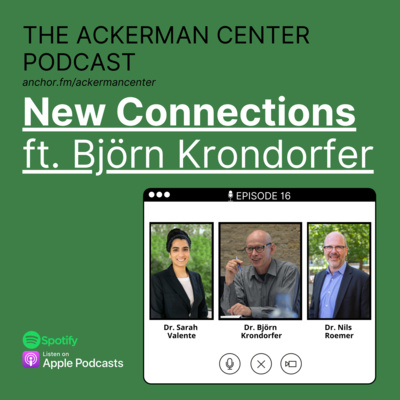
Ep. 16: New Connections ft. Björn Krondorfer
Listen to our insightful conversation with Dr. Björn Krondorfer, director of the Martin-Springer Institute and Endowed Professor of Comparative Religious Studies at Northern Arizona University. We touch on topics of reconciliation, mutual understanding, and necessary new approaches to Holocaust, Human Rights, and Genocide Studies education. Dr. Krondorfer provides what Dr. Roemer calls, "a measured message of hope in the age of pessimism."

Ep. 15: Anne Frank Parallel Stories
Please join Dr. Nils Roemer and Dr. Sarah Valente for a live conversation about the newly-released documentary Anne Frank Parallel Stories. Oscar-winning actress Helen Mirren retraces the life of Anne Frank through the pages of her diary and introduces us to the stories of five other Holocaust survivors. We invite you to watch this documentary, which is available on Netflix, prior to our conversation.
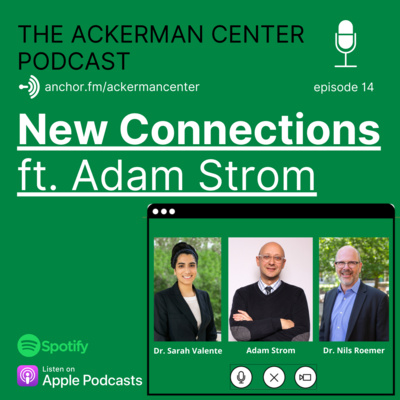
Ep. 14: New Connections ft. Adam Strom
In the "New Connections" series, Dr. Sarah Valente and Dr. Nils Roemer meet with directors of Holocaust and Human Rights centers, organizations, and museums around the world. Our featured guest today is Adam Strom, the Director of Re-Imagining Migration in Boston, and the former Director of Scholarship and Innovation at Facing History and Ourselves. Resources developed under his direction have been used in tens of thousands of classrooms and experienced by millions of students around the world.
To learn more about our special guest and Re-Imagining Migration in Boston, please be sure to visit their website at https://reimaginingmigration.org/ and to learn about Facing History and Ourselves, visit: https://www.facinghistory.org/.

Ep. 13: America: Multitude of Many
On this Fourth of July weekend, listen to Dr. Nils Roemer and Dr. Sarah Valente discuss the contributions of Jewish-Americans Emma Lazarus and Irving Berlin to American culture. #GodBlessAmerica #GiveMeYourTiredYourPoor

Ep. 12: Operation Barbarossa
Join Dr. Sarah Valente and Dr. Nils Roemer to learn about Operation Barbarossa, the creation of the word "genocide" by Raphael Lemkin, and be inspired by new music by Max Richter that appeals to our common humanity.

Ep. 11: Landmark Decisions
In this new episode, Dr. Valente and Dr. Roemer discuss an exciting upcoming lecture on Operation Barbarossa, the Teacher Institute workshop, which will be hosted virtually by the Ackerman Center this week, and the beautiful concert "We Are Here" (you get to enjoy a few musical fragments from the concert). The professors also reflect on this past week's monumental landmark decisions by the U.S. Supreme Court on LGBT rights, and on protection for young immigrants. They consider how historically these vulnerable groups were persecuted during the Nazi regime.
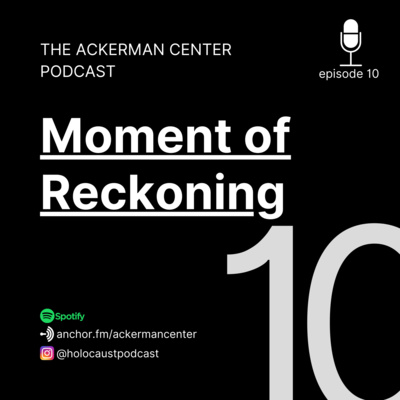
Ep. 10: Moment of Reckoning
In this episode Dr. Valente and Dr. Roemer discuss Deeyah Khan's 2017 Emmy-winning documentary White Right: Meeting the Enemy, and the historical parallels in the rise of anti-Semitism in moments of crisis in Germany in the 1930s and during the current COVID-19 pandemic.
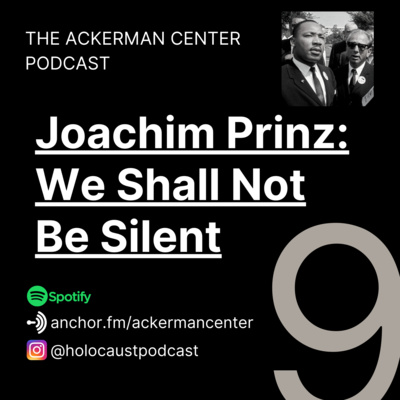
Ep. 9: Joachim Prinz: We Shall Not Be Silent
“The most important thing that I learned in my life is that bigotry and hatred are not the most urgent problem. The most urgent, the most disgraceful, the most shameful and the most tragic problem is silence." Rabbi Joachim Prinz
Prinz was a rabbi of the Jewish community in Berlin under the Hitler regime and victim of the Holocaust who spoke minutes before Martin Luther King, Jr. took the stage to deliver his famous “I Have a Dream” speech in the 1963 March on Washington. His words are a timely reminder for us all.
Join Dr. Valente in conversation with Dr. Roemer as they discuss Prinz's speech in this new episode of the Ackerman Center Podcast.